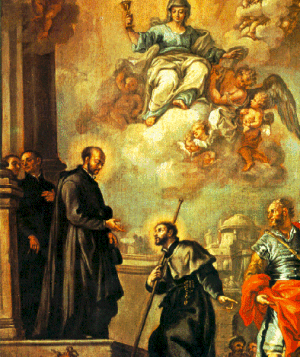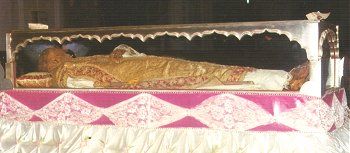“It is not the actual physical exertion that counts towards a man’s progress, nor the nature of the task, but by the spirit of faith with which it is undertaken.”
Today, December 3, we celebrate the feast day of Saint Frances Xavier (1506-1552), Jesuit missionary, miracle-worker, and tireless proclaimer of the Word of God. Saint Frances traveled the world at a time when such things were significantly more difficult, always eager to take the Christian faith, and the salvation of Jesus Christ, to those who needed it. One of the seven original men who founded the Jesuits, the legacy of Saint Frances lives on today through the international mission work continued by the Society of Jesus.
Frances was born into nobility, growing up in his family’s castle in Navarre, Spain. He was fortunate to receive tutoring—a privilege of the noble class-- which prepared him to continue his education. At the age of 19, he undertook studies in Paris, at the College of Sainte-Barbe, living as roommates with Blessed Peter Faber.
Frances’ studies were progressing according to plan when everything changed dramatically. When he was just 23, he encountered Saint Ignatius of Loyola, an older student, who demonstrated a prayerful life to Frances. Not before long, Peter Faber had joined Ignatius in his wish to enter the priesthood. Frances, however, resisted, truly aspiring to worldly career. Earning his degree, Frances began teaching philosophy at the College of Dormans-Beauvais in Paris, but continued lived with Faber and Loyola. Eventually, the constant witness of Saint Ignatius softened Frances’ heart, and he accepted his calling. Along with four other friends, the seven young men pronounced vows of poverty, chastity, and mission work in 1534. Their goal, inspired by Ignatius, was to travel to the Holy Land to “convert the infidels.”
That same year, Saint Xavier began studying theology. Two years later, the group traveled to Venice, where they would board a ship to the Holy Land. It took several months to find passage, during which time they volunteered in hospitals. Frances further traveled to Rome, seeking papal permission for their mission, and requesting ordination of those among them not yet priests. Saint Frances, Saint Ignatius and four others were ordained by the papal delegate in his private chapel in 1537.
They waited another year for a ship to the Holy Land, due to war, nothing was sailing. Instead, the group dispersed to colleges, preaching and teaching, and Saint Ignatius traveled to Rome and placed the group at the disposal of the pope.
Saint Frances went to Rome in April 1538 and began preaching in the French church of St. Louis. There, he also helped form the new religious order, The Society of Jesus, known as the Jesuits. Before long, he was asked to travel to India by Saint Ignatius. This was a bittersweet assignment: Sweet in that Frances would be bringing the Gospel of Christ to those who hadn’t heard it; bitter in that he would likely never see his closest friend—Saint Ignatius—again. Obediently, and excitedly, he went.
This trip was the start of Saint Frances’ missionary calling. He worked in Lisbon, Portugal, caring for prisoners, while waiting for the ship to take him to India. One year later, on his thirty-fifty birthday, he boarded a ship, with a letter of authority over all clergy in Goa in hand. Thirteen months later, he arrived in India. In the meantime, he had worked in Mozambique, where the crew had waited some time for “favorable winds.”
Saint Frances embraced his new job with vigor, attempting to learn Tamil to speak with the locals, but generally relying on translators. He traveled throughout India and the Spice Islands, converting thousands, preaching, and baptizing upwards of 10,000. Saint Frances paid special attention to children, instructing them early in the ways of the faith, and modeling the perfection of Christian virtues. Wherever he went, he lived with the poorest people, sharing their food and rough accommodations. He spent countless hours ministering to the sick and the poor, particularly to lepers. Very often he had no time to sleep or even to say his breviary but, as we know from his letters, he was filled always with joy.
From a letter from Saint Frances to his superiors in Rome:
“Every Sunday I collected them all, men and women, boys and girls, in the church. They came with great readiness and with a great desire for instruction. Then, in the hearing of all, I began by calling on the name of the most holy Trinity, Father, Son, and Holy Ghost, and I recited aloud the Lord's Prayer, the Hail Mary, and the Creed in the language of the country: they all followed me in the same words, and delighted in it wonderfully. Then I repeated the Creed by myself, dwelling upon each article singly. Then I asked them as to each article, whether they believed it unhesitatingly; and all, with a loud voice and their hands crossed over their breasts, professed aloud that they truly believed it. I take care to make them repeat the Creed oftener than the other prayers; and I tell them that those who believe all that is contained therein are called Christians. After explaining the Creed I go on to the Commandments, teaching them that the Christian law is contained in those ten precepts, and that every one who observes them all faithfully is a good and true Christian and is certain of eternal salvation, and that, on the other hand, whoever neglects a single one of them is a bad Christian, and will be cast into hell unless he is truly penitent for his sin. Converts and heathen alike are astonished at all this, which shows them the holiness of the Christian law, its perfect consistency with itself, and its agreement with reason.
As to the numbers who become Christians, you may understand them from this, that it often happens to me to be hardly able to use my hands from the fatigue of baptizing: often in a single day I have baptized whole villages. Sometimes I have lost my voice and strength altogether with repeating again and again the Credo and the other forms. The fruit that is reaped by the baptism of infants, as well as by the instruction of children and others, is quite incredible. These children, I trust heartily, by the grace of God, will be much better than their fathers. They show an ardent love for the Divine law, and an extraordinary zeal for learning our holy religion and imparting it to others. Their hatred for idolatry is marvelous.”
From India, he traveled to Japan in 1549. Because he could find no ship captain willing to take him, he hired a pirate to take he and his companions. Upon arrival, he was given permission by the local prince to preach Christianity. However, the prince refused to convert, so Saint Frances set his sights on the Emperor. However, he was unable to learn how to find the capital city, so remained in Kagoshima for one year, and then Hirado for one year. In each city, he had little success, converting only 100 people.
Eventually, the small band of Jesuit brothers found a prince willing to take them to the Imperial City to have audience with the emperor. However, they were unsuccessful, learning that the real power lied with the Daimyo of Yamaguchi. A self-important man, they realized that would need to appeal to his sense of pride. To impress him, the brothers dressed in fineries and presented lavish gifts. The daimyo not only provided them with a residence, but decreed that any of his citizens could become Christian. Soon, they had converted over 500.
Saint Frances left some Jesuits to continue his work in Japan, and set sail to return to India. However, while sailing, he caught sight of China, and felt called to that country. He sailed for Singapore where he tried to secure passage to China. None would take him, however, and he soon fell ill. After seven days, he fell into a coma, but later awakened to devote himself to prayer. He died on December 3, and was buried. When his body was exhumed, it was found to be incorrupt. His remains were later translated to Goa, where they were interred in the Church of Good Jesus.
The life of Saint Frances Xavier is remarkable. In all, his mission work was amazingly successful, personally baptizing more than 40,000 converts over ten years in India, the East Indies, and Japan. Willing to speak with anyone, he dined with head hunters, washed the sores of lepers, and lived amongst the most poor and needy he could find. He traveled thousands of miles, mostly on his bare feet, and saw the greater part of the Far East before any other missionary. Saint Frances was further reported to have the gift of tongues, which aided him in his travels. Numerous miracles are reported at his intercession, including the raising of the dead, calming of storms, miraculous healing, and the gift of prophecy. The real miracle of his life, as has been said, however, was the miracle of his personality, by which he was able to convert thousands to the faith wherever he went and to win their passionate devotion.
From a letter of Saint Frances Xavier to Saint Ignatius of Loyola:
“We have visited the villages of the new converts who accepted the Christian religion a few years ago. The country is so utterly barren and poor. The native Christians have no priests. They know only that they are Christians. There is nobody to say Mass for them; nobody to teach them the Creed, the Our Father, the Hail Mary and the Commandments of God’s Law.
I have not stopped since the day I arrived. I conscientiously made the rounds of the villages. I bathed in the sacred waters all the children who had not yet been baptized. This means that I have purified a very large number of children so young that, as the saying goes, they could not tell their right hand from their left. The older children would not let me say my Office or eat or sleep until I taught them one prayer or another. Then I began to understand: “The kingdom of heaven belongs to such as these.”
I could not refuse so devout a request without failing in devotion myself. I taught them, first the confession of faith in the Father, the Son, and the Holy Spirit; then the Apostles’ Creed, the Our Father, and Hail Mary. I noticed among them persons of great intelligence. If only someone could educate them in the Christian way of life, I have no doubt that they would make excellent Christians.
Many, many people hereabouts are not becoming Christians for one reason only: there is nobody to make them Christians.
I wish the university students would work as hard at converting these people as they do at their books, and so settle their account with God for their learning and the talents entrusted to them.
This thought would certainly stir most of them to meditate on spiritual realities, to listen actively to what God is saying to them. They would forget their own desires, their human affairs, and give themselves over entirely to God’s will and his choice.
They would cry out with all their heart: “Lord, I am here! What do you want me to do?” Send me anywhere you like - even to India!”
Prayer to Saint Frances Xavier:
O great Saint Francis, well beloved and full of charity, with thee I reverently adore the Divine Majesty; and since I specially rejoice in the singular gifts of grace bestowed on thee in life, and of glory after death, I give thanks to God, and beg of thee, with all the affection of my heart that by thy powerful intercession thou mayest obtain for me above all things the grace to live a holy life and die a holy death. Moreover, I beg of thee to obtain for me (here insert some special spiritual or temporal favor); but if what I ask does not tend to the glory of God and the greater good of my soul, do thou, I beseech thee, obtain for me what will more certainly attain these ends. Amen
God our Father, by the preaching of Francis Xavier You brought many nations to Yourself.
Give his zeal for the faith to all who believe in You,
that Your Church may rejoice in continued growth throughout the world.
Grant this through our Lord Jesus Christ, Your Son, who lives and reigns with You and the Holy Spirit, one God, for ever and ever. Amen.
Day 337 of 365
Prayer Intentions: Courageous lives of faith centered on the Lord.
Requested Intentions: Successful passing of examination; Employment for Son (J); Healing of a family and son (S); Successful marriage (G); End to husband’s addictions; Son’s employment (M); Freedom from financial burdens (M); Healing after a miscarriage (E); For healing of friend; successful resolution of legal matter (A); For unity between estranged friends (E); For a son, falsely arrested (C); Successful employment (J); Successful employment (L); For a healthy child (L); Recovery from stomach illness of a friend (A); Employment and financial security (E); Conversion of sons (L); Freedom from financial stress, employment (C); Spiritual growth and family peace (A); Freedom to immigrate (D); End to debt (N); Restoration of a marriage (J); Complete recovery of son (P); Recovery of parish priest, health of mother, conversion of son (J); Successful employment, end to depression (J); Successful immigration and employment (S); Conversion of an unloving daughter (M); Recovery of husband, health of mother, economic freedom (R); Freedom from depression, restoration of family relationships (N); Restoration of a relationship (J); Healing of friends from cancer (J); Complete healing of a friend with pancreatic cancer (J); Healing of a father following stroke (S).
Why pray the Rosary every day for a year?
Each time the Blessed Virgin has appeared-- whether it be to Saint Bernadette Soubirous at Lourdes; to Lucia, Jacinta, and Francisco at Fatima; or to Mariette Beco at Banneux-- she has asserted the importance, saving grace, and power of praying the Holy Rosary on a daily basis. Based upon her words, the Rosary is penance and conversion for sinners, a pathway to peace, an end to war, and a powerful act of faith in Jesus Christ. Pope Paul VI presented the Rosary as a powerful means to reach Christ "not merely with Mary but indeed, insofar as this is possible to us, in the same way as Mary, who is certainly the one who thought about Him more than anyone else has ever done."
To show us how this is done, perhaps no one has been more eloquent than the great Cardinal Newman, who wrote: "The great power of the Rosary consists in the fact that it translates the Creed into Prayer. Of course, the Creed is already in a certain sense a prayer and a great act of homage towards God, but the Rosary brings us to meditate again on the great truth of His life and death, and brings this truth close to our hearts. Even Christians, although they know God, usually fear rather than love Him. The strength of the Rosary lies in the particular manner in which it considers these mysteries, since all our thinking about Christ is intertwined with the thought of His Mother, in the relations between Mother and Son; the Holy Family is presented to us, the home in which God lived His infinite love."
As Mary said at Fatima, "Jesus wants to use you to make Me known and loved. He wishes to establish the devotion to My Immaculate Heart throughout the world. I promise salvation to whoever embraces it; these souls will be dear to God, like flowers put by Me to adorn his throne."

Subscribe to:
Post Comments (Atom)




























0 comments:
Post a Comment
Thanks for leaving a comment. If you wish to submit a prayer request, however, please do so above, using the "Contact" tab.